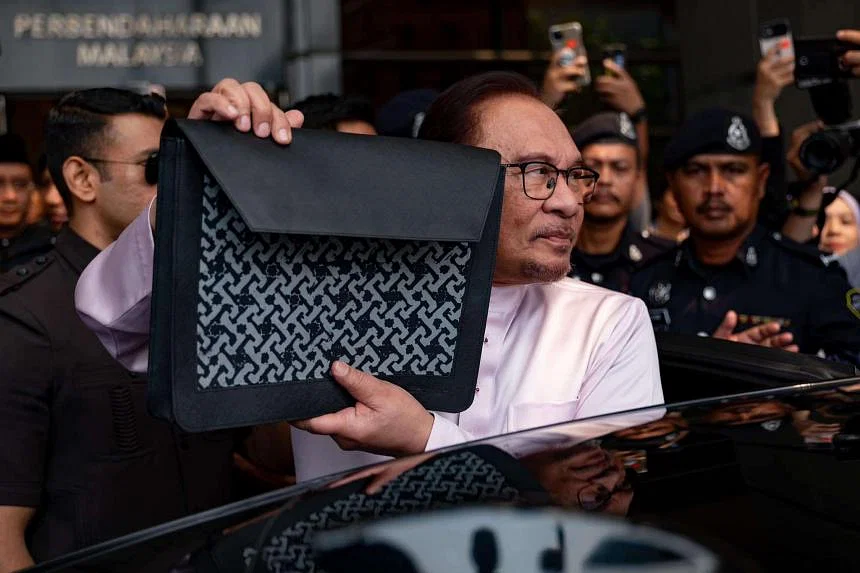KUALA LUMPUR – Prime Minister Anwar Ibrahim on Friday unveiled Malaysia’s biggest-ever budget, pencilling in RM393.8 billion (S$114 billion) to be spent in 2024 to counter slowing growth from global headwinds that are expected to persist in the new year.
This is his unity government’s first “from scratch” spending plan, having inherited Budget 2023 after coming to power in November, just over a month before 2023 began. His administration made small revisions to the budget in February to increase spending to RM388.1 billion.
This time, there are more concrete efforts to change the structure of government finances, introducing new taxes and dipping its toes into reforming fuel subsidies, the biggest component of the Treasury’s subsidy and assistance bill which is set to breach RM81 billion in 2023.
Datuk Seri Anwar, who is also Finance Minister, said the imperative to “fix the defects of the national economic system” was due to “post-normal times” after the Covid-19 pandemic “defined by chaos, complexity, contradiction” which has “victimised the public, damaged ecosystems and disrupted food supply chains”.
“A clear example is blanket subsidies that benefit the elite and wealthy. Economic wisdom should head towards equitable growth,” he said, citing past excesses as the cause of public debt and liabilities breaching RM1.5 trillion, or 82 per cent of the economy.
This has resulted in over 15 sen of each ringgit of government revenue being used to service debt interest.
Despite development expenditure dropping from RM97 billion in 2023 to RM90 billion in 2024, the new year will see more infrastructure spending such as RM15 billion on expanding light rail transit projects. This is because the 2023 figure included RM13.2 billion spent to pay off debts of scandal-ridden state fund 1Malaysia Development Berhad.
The Anwar administration’s 11 months in power have been marked by persistent political sabre-rattling, with the opposition gaining ground among the Malay-Muslim majority, which some have attributed to rising ethnic and religious rhetoric.
Economic data, however, has shown that the country’s poorest largely support the opposition coalition Perikatan Nasional.
Mr Anwar has cited economic development as a means to address the rising religious conservatism and voter discontent.
“First, economic development. A more just, equitable system so that no community or part of the country is seen to be ignored or marginalised,” he told Time Magazine in an interview published on Wednesday, when asked how he plans to tackle Malay-Islamist supremacist rhetoric.
The government spending seeks to be a buffer against geopolitical tensions, such as the Russia-Ukraine war, China’s slowdown as well as supply chain and trade issues that have weighed on Malaysia’s prospects and are expected to continue to do so.
The Finance Ministry expects the economy to grow just 4 per cent in 2023 – less than half of 2022’s 8.7 per cent – and to stay in the 4 to 5 per cent range in 2024.
For 2023, government expenditure is expected to exceed revenue by 5 per cent of gross domestic product, down from 5.6 per cent in 2022.
This figure is expected to drop further in 2024, with Mr Anwar announcing a targeted 4.3 per cent budget deficit for 2024.
Despite this, interest payments alone on federal government borrowings will rise to nearly RM50 billion in 2024, about 16.4 per cent of revenue.
Among initiatives being rolled out for 2024 to rein in the deficit are subsidy cuts, which will bring the final bill to RM52.8 billion, nearly a fifth lower than that in 2023.
Apart from removing subsidies for food items like chicken and eggs, a major initiative will be to rationalise diesel subsidies in phases to stifle smuggling.
Although the number of diesel vehicles has increased only 3 per cent since 2019, sales of the fuel have surged by 40 per cent in that period, indicating a loss of subsidies (currently at RM1.60 per litre worth RM1.5 billion annually) across the border.
Mr Anwar said “select users such as goods transporting companies” will still enjoy diesel subsidies.
According to Socio-Economic Research Centre’s executive director Lee Heng Guie, the diesel reform will serve as a pilot programme before being expanded to petrol subsidies, the most widely used fuel.
“But whether there will be buy-in, if there is too much noise, then the government may pull back,” he told The Straits Times.
Despite an increase in cash handouts for about 60 per cent of the poorest adult population by a quarter to RM10 billion (the maximum payout will increase to RM3,700 from RM3,100), the plan to cut subsidies is already causing anxiety.
“It seems the policies are to turn the poor into pariahs,” said 45-year-old religious teacher Sulaiman Kassim, who insisted the floating of diesel, chicken and egg prices will have a knock-on effect on overall inflation of other expenses.
New taxes include a 10 per cent capital gains tax on the disposal of unlisted shares. A luxury goods tax (5 to 10 per cent) will also be introduced to boost revenue. Meanwhile, services tax will be increased from 6 to 8 per cent and encompass a wider range of activities including brokerage, karaoke and logistics.
But analysts believe this is more a stepping stone than a real game changer that will move the needle on government coffers, which are expected to grow by only a modest 1.5 per cent in 2024.
“I think the government is being tactical with taxes. It doesn’t do as much as what we expected, but it could be expanded in phases because I think the current government seems to be careful to not put too much burden too soon on the middle class,” Kenanga Investment Bank’s economic research chief Wan Suhaimie Saidie told ST.
Reference : https://www.straitstimes.com/asia/se-asia/malaysia-seeks-to-spend-its-way-out-of-rough-economic-waters-with-budget-2024

